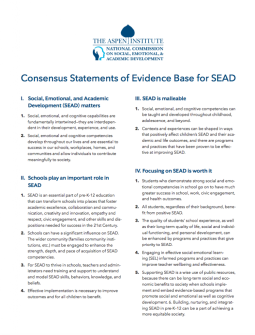Given the abundance of attention being paid to Social, Emotional and Academic Development (SEAD) and Social and Emotional Learning (SEL) in general, it’s only appropriate that the path forward be guided by research.
While some may put SEL and SEAD solely in the “soft skills” category of education initiatives, the benefits extend far beyond anything “soft.” The results are real -- and the data speaks for itself.
A benefit-cost analysis of SEL interventions revealed a positive return on the investment averaging $11 in long term benefits for every $1 invested.
About a year ago, the Aspen Institute launched the National Commission on Social, Emotional, and Academic Development (NCSEAD) which is co-chaired by Linda Darling-Hammond, John Engler and Tim Shriver. The Commission is overseen by Aspen’s Jacqueline Jodl and, working closely with CASEL and many others, seeks to build consensus around a lexicon, metrics, and strategies for SEL.
A significant milestone in the process took place last week, with NCSEAD’s Council of Distinguished Scientists hosting a panel during which they released the Consensus Statements of Evidence and Next Generation Research.
The Consensus Statements of Evidence are further outlined in the publication, The Evidence Base for How We Learn: Supporting Students’ Social, Emotional, and Academic Development. The paper was authored by Harvard’s Stephanie Jones and Jennifer Kahn and points to how integral SEL is to academics:

The consensus statements and surrounding research will illuminate the path forward for those seeking to integrate SEAD into daily learning processes.
The Consensus Statements
The statements are grounded in scientific research and, according to the report, “Move the nation beyond the debate as to whether schools should attend to students’ social and emotional development, to how we can integrate social, emotional and academic development into the mission and daily work of all schools. Link here to download a one-page overview.

The scientists grouped the statements into four broad themes. Our Getting Smart team weighed in regarding each theme, drawing connections to related SEL:
- SEAD matters. We love the first statement regarding the intertwined nature. This has proven true in every phase of education worked in. In the blog Embedding SEL Across the Curriculum, we speak to the inherent relationship between SEL and core content areas.
- Schools play an important role in SEAD. Effective implementation is key. We need to ensure proper training and assessment (linked to standards) of SEAD to truly improve outcomes for ALL students. Without effective implementation it can cause more divide in students who need it most. An example of effective implementation in schools is highlighted in the How Minecraft Supports SEL Report.
- SEAD is malleable. The statement that “Social, emotional, and cognitive competencies can be taught and developed throughout childhood, adolescence, and beyond,” certainly underscores Carol Dweck’s work around growth mindset. In short, we aren’t simply born with or without SEL traits; rather, they can be taught and shaped throughout our experiences.
- Focusing on SEAD is worth it. The ROI of $11 benefit for $1 cost speaks for itself! We also know that many educators love to learn about the science behind the process - check out Dr. Daniel Siegel’s podcast on The Teenage Mind for more.
The Panel
The Council of Distinguished Scientists hosted a panel in conjunction with the release of the statements, providing an opportunity for members of this expert body of scientists and researchers to share the work that has been done in the field and to lay the groundwork for a next-generation research agenda relating to SEAD.
Panelists included:
- Antwan Wilson, Chancellor of D.C. Public Schools; Commissioner, National Commission
- Marc Brackett, Director, Yale Center for Emotional Intelligence; Professor, Yale Child Study Center; Council of Distinguished Scientists
- Zoe Stemm-Calderon, Director, Education, Raikes Foundation; Funders Collaborative
- Jim Balfanz, President, City Year; Council of Distinguished Educators
A complete list of the Council of Distinguished Scientists along with Commissioners, the Council of Distinguished Educators, Youth Commissioners and the Partner Collaborative has been made available by Aspen Institute.
We are grateful that the Aspen Institute is leading this work and we celebrate the research that demonstrates such positive student and societal outcomes and reinforces that the path forward for effective schools includes intentionality around SEAD.
For more on SEL and SEAD read:
- Getting Smart Podcast | CASEL: Leading Advocate for Social Emotional Learning
- 3 Reasons SEL Assessments Aren’t “Just Another Test”
- 10 Ways Educators Can Use SEL Measurement and Assessment for Student Success
- How 2 Minutes of SEL Can Change the Tone for the Day
Stay in-the-know with all things EdTech and innovations in learning by signing up to receive the weekly Smart Update.span>